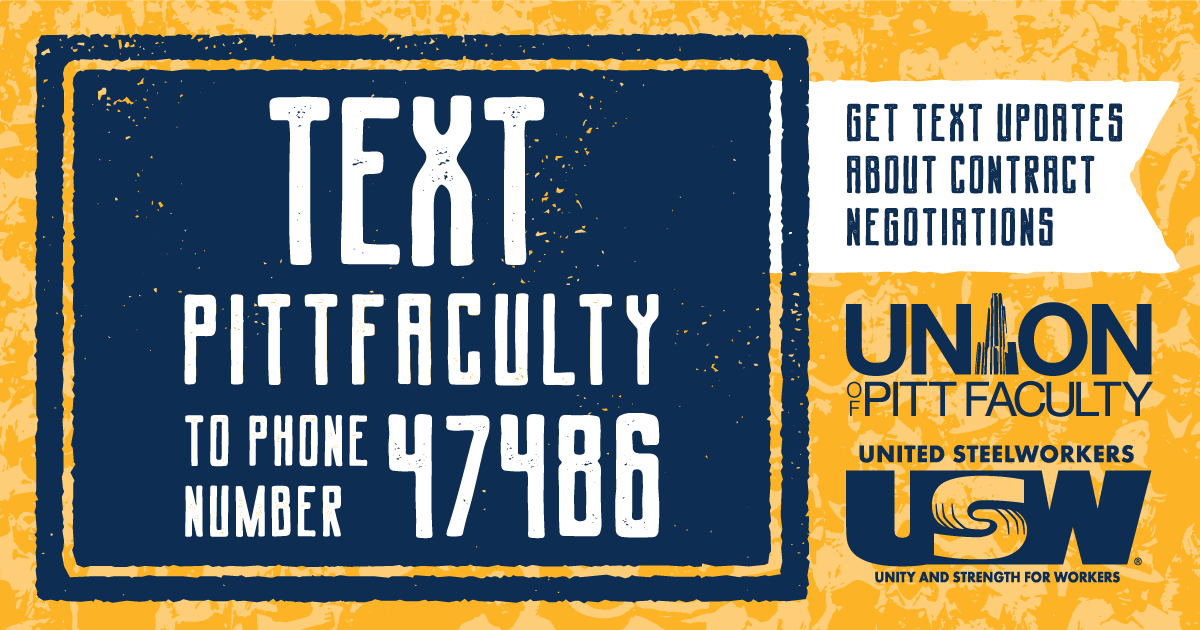BARGAINING UPDATE
November 1, 2023
HUGE win on FT/NTS job security; prep for legal action over admin delays on economic bargaining
Takeaways:
Dear colleagues,
We met with the administration yesterday.
We are very proud to announce that, after many months of hard negotiations, we finally came to a tentative agreement with the administration on new policies that will transform the process of appointment and renewal for full-time non-tenure stream faculty. This tentative agreement establishes a new right of "presumptive renewal" for such faculty. This means that after a short probationary period—normally one or two years—all full-time non-tenure stream faculty will have their appointments automatically renewed, with nonrenewals limited to a short list of specific conditions, primarily demonstrable lack of work. The tentative agreement also ensures that faculty appointment lengths increase at promotion, ending a system in which large numbers of faculty have been stuck endlessly in one-year appointments.
Job security is the most important non-economic priority that you charged us with in the bargaining survey, and this tentative agreement, in combination with our tentative agreement on part-time faculty, represents a dramatic win on job security for faculty at Pitt. If you are doing a good job and there is work for you to do, you can keep doing your job. This sounds reasonable, but at Pitt and across our industry the norm has increasingly been the opposite, that part-time and full-time faculty must continually reapply for their jobs and worry constantly that any conflict or disagreement with an administrator may put their livelihoods at risk. We were able to achieve this major victory because you showed repeatedly that you were willing to stand with your colleagues to fight for better jobs and a better future for each other by signing membership cards and participating in actions.
We also tentatively agreed to articles on grievance and arbitration and tenure-stream and tenured faculty. Grievance and arbitration is the heart of our contract, allowing us to enforce the new rights we have won. We have had to fight hard to win a strong grievance procedure, and to resist the administration's efforts to carve out important parts of the contract from the protections of the grievance procedure. Under this tentative agreement, when we cannot resolve disagreements collaboratively, we can appeal to a neutral third-party labor arbitrator to make a binding decision. Instead of the current system, in which the administration has the final say on all disputes, this tentative agreement will ensure that the faculty are on truly equal footing with the administration when it comes to implementing and enforcing our contract.
Our tentative agreements on tenure-stream and tenured faculty codify the existing tenure system into the contract, which means that the protections of tenure will also be legally enforceable through our grievance procedure. While tenure can appear to be a strong protection, the policies underlying our existing tenure system are quite thin, and very hard to enforce if they are applied unfairly. And while such cases may be rare, in our politically and economically volatile times the limitations of the existing policy are a risk. Having tenure as part of our contract will strengthen it considerably and ensure that it will be there when we really need it.
Despite these major victories, we cannot continue to wait for the administration to come to the table to bargain over fair pay and benefits. On Tuesday we again pressed the administration, yet again, for their responses to our compensation, benefits, leaves, and research support proposals, which we presented fully a year ago.
The administration thinks that if they delay bargaining over economics, we’ll become desperate and agree to a bad deal. But they are legally obligated to respond to our proposals in a reasonable time, and a year does not meet anyone's definition of “reasonable.”
We next meet with the administration on November 8, and if we do not receive counterproposals on these long-outstanding proposals, we will file unfair practice charges with the Pennsylvania Labor Relations Board. We strongly prefer bargaining to filing charges, but fair pay is too urgent for us to let the administration continue to unlawfully delay.
In solidarity,
Your bargaining committee
Tyler Bickford (chair), Professor, English, Oakland
Pete Bell, Teaching Assistant Professor, Chemistry, Oakland
Nicholas Bircher, Part-time Professor, Nurse Anesthesia, Oakland
Chloe Dufour, Faculty Librarian, ULS, Oakland
Anthony Fabio, Associate Professor, Epidemiology (Public Health), Oakland
Lech Harris (secretary), Part-time Instructor, English, Oakland
James Hill (archivist), Visiting Assistant Professor, History, Oakland
Megan O’Brien, Master Teacher, Falk Laboratory School, Oakland
Sabrina Robinson, Part-time Instructor, Slavic, Oakland
Evan Schneider, Assistant Professor, Physics and Astronomy, Oakland
Paul Scott, Assistant Professor, Health and Community Systems (Nursing), Oakland
Jeffrey Shook, Professor, Social Work, Oakland
Stacey Triplette, Associate Professor, Spanish, Greensburg
Abagael West, Teaching Assistant Professor, Biological Sciences, Oakland
Links!
- We agreed to a transformative article protecting job security for full-time non-tenure stream faculty.
- We also agreed to core articles addressing grievance and arbitration as well as tenure-stream and tenured faculty.
- Having still not received any response to our economic proposals from September 2022, we are preparing to file a labor board charge if we do not receive these when we meet next week.
Dear colleagues,
We met with the administration yesterday.
We are very proud to announce that, after many months of hard negotiations, we finally came to a tentative agreement with the administration on new policies that will transform the process of appointment and renewal for full-time non-tenure stream faculty. This tentative agreement establishes a new right of "presumptive renewal" for such faculty. This means that after a short probationary period—normally one or two years—all full-time non-tenure stream faculty will have their appointments automatically renewed, with nonrenewals limited to a short list of specific conditions, primarily demonstrable lack of work. The tentative agreement also ensures that faculty appointment lengths increase at promotion, ending a system in which large numbers of faculty have been stuck endlessly in one-year appointments.
Job security is the most important non-economic priority that you charged us with in the bargaining survey, and this tentative agreement, in combination with our tentative agreement on part-time faculty, represents a dramatic win on job security for faculty at Pitt. If you are doing a good job and there is work for you to do, you can keep doing your job. This sounds reasonable, but at Pitt and across our industry the norm has increasingly been the opposite, that part-time and full-time faculty must continually reapply for their jobs and worry constantly that any conflict or disagreement with an administrator may put their livelihoods at risk. We were able to achieve this major victory because you showed repeatedly that you were willing to stand with your colleagues to fight for better jobs and a better future for each other by signing membership cards and participating in actions.
We also tentatively agreed to articles on grievance and arbitration and tenure-stream and tenured faculty. Grievance and arbitration is the heart of our contract, allowing us to enforce the new rights we have won. We have had to fight hard to win a strong grievance procedure, and to resist the administration's efforts to carve out important parts of the contract from the protections of the grievance procedure. Under this tentative agreement, when we cannot resolve disagreements collaboratively, we can appeal to a neutral third-party labor arbitrator to make a binding decision. Instead of the current system, in which the administration has the final say on all disputes, this tentative agreement will ensure that the faculty are on truly equal footing with the administration when it comes to implementing and enforcing our contract.
Our tentative agreements on tenure-stream and tenured faculty codify the existing tenure system into the contract, which means that the protections of tenure will also be legally enforceable through our grievance procedure. While tenure can appear to be a strong protection, the policies underlying our existing tenure system are quite thin, and very hard to enforce if they are applied unfairly. And while such cases may be rare, in our politically and economically volatile times the limitations of the existing policy are a risk. Having tenure as part of our contract will strengthen it considerably and ensure that it will be there when we really need it.
Despite these major victories, we cannot continue to wait for the administration to come to the table to bargain over fair pay and benefits. On Tuesday we again pressed the administration, yet again, for their responses to our compensation, benefits, leaves, and research support proposals, which we presented fully a year ago.
The administration thinks that if they delay bargaining over economics, we’ll become desperate and agree to a bad deal. But they are legally obligated to respond to our proposals in a reasonable time, and a year does not meet anyone's definition of “reasonable.”
We next meet with the administration on November 8, and if we do not receive counterproposals on these long-outstanding proposals, we will file unfair practice charges with the Pennsylvania Labor Relations Board. We strongly prefer bargaining to filing charges, but fair pay is too urgent for us to let the administration continue to unlawfully delay.
In solidarity,
Your bargaining committee
Tyler Bickford (chair), Professor, English, Oakland
Pete Bell, Teaching Assistant Professor, Chemistry, Oakland
Nicholas Bircher, Part-time Professor, Nurse Anesthesia, Oakland
Chloe Dufour, Faculty Librarian, ULS, Oakland
Anthony Fabio, Associate Professor, Epidemiology (Public Health), Oakland
Lech Harris (secretary), Part-time Instructor, English, Oakland
James Hill (archivist), Visiting Assistant Professor, History, Oakland
Megan O’Brien, Master Teacher, Falk Laboratory School, Oakland
Sabrina Robinson, Part-time Instructor, Slavic, Oakland
Evan Schneider, Assistant Professor, Physics and Astronomy, Oakland
Paul Scott, Assistant Professor, Health and Community Systems (Nursing), Oakland
Jeffrey Shook, Professor, Social Work, Oakland
Stacey Triplette, Associate Professor, Spanish, Greensburg
Abagael West, Teaching Assistant Professor, Biological Sciences, Oakland
Links!
- If someone forwarded this to you, sign up to receive these emails
- Find previous bargaining updates here
- Status of bargaining
- Get in touch with your Council rep
- Get involved with the Communication and Action Team



